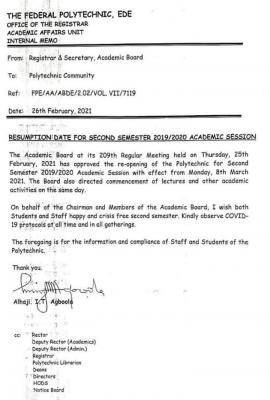
The Federal Government has concluded plans to introduce Herbal Medicine studies in Nigerian universities as from next year.
Already, the Joint Admission Matriculation Examinations has been placed on notice to provide a space for candidates interested in the studying HM in the UTME on their forms.
The Minister of Health, Prof. Onyebuchi Chukwu, who disclosed this on Friday evening in Abuja during the 3rd Annual Guest Lecture organized by Medical and Health Workers Union of Nigeria with the theme: ‘Developing Human Resources for Health for the attainment of Universal Health Coverage: Issues and Perspectives’ said it was a deliberate effort to hasten the attainment of Universal Health Coverage in the country.
The Guest lecturer was Dr. Abubakar Sokoto Mohammed of the Department of Sociology, Usman Danfodio University, Sokoto.
The Minister, however, advised the MHWUN to buy into the MH and pay their contribution in the National Health Insurance Scheme to enable them access quality health care services even after their retirement from service.
Similar Posts:
He said, “They say we cannot achieve Universal Health Coverage unless herbal medicine practitioners are involved. But I say they must be trained. Finally, a committee has submitted a curriculum which we are going to take to the National Council on Health. It is a very beautiful curriculum.
“We are taking Herbal Medicine to the Universities. Without it, there is no integration. This is because, if you are a herbal practitioner, you are a Doctor. A herbalist is a doctor. But the first function of a doctor is to take a diagnosis. It it Lasser Fever or Ebola or is it dengue or is it malaria or typhoid?
“You have to get the answer before you begin to give that herb. You cannot do that unless you learn those sciences that will enable you get the results-physiology, pharmacology, pathology, anatomy, biochemistry and all others. If you don’t learn them you will not know anything about the human body.
“The herbal practitioners are working with me because they saw what we are doing. Hopefully, once the NCH approved it, it is possible that by next year, in Joint Admission Matriculation Examinations, some people may be filling to read Herbal Medicine.”
Chukwu further argued that for the health sector to attain the desired progress, there was the need for dominance and high participation of non government practitioners in the sector.
“For the country to attain its desired UHC, the health sector must be dominated and handled by the non-government actors. It does not matter whether it is for profit or non profit. More of health must be handled by non-government involvement. If we don’t reach that place, believe you me, there will be no universal health coverage.
“This is because we are not running a socialist government in Nigeria, we are running a capitalist government and under a capital regime, if you don’t put things under the non-government sector, it will never work.
“Today, government is controlling most of the health sectors, that is why it is not working the way we wanted it is work. We are also looking into our curriculum so that we will include entrepreneurial scheme so that when medical students come out from school, they will know how to access loan and how to run a business.”
In his lecture, Sokoto, warned the medical and health workers against intense rivalry in the sector, stressing, “It does not help the sector. There is the need for us to work together.”
He advised the three tiers of governments to finance the NIHS, which according to him will provide quality health services to the poor and will also fastrack the attainment of universal health in the country.
Sokoto said, “This is because, the government said all people will have to contribute, but there are people that are living below one dollar per day, how can they contribute? And they are the majority. So the only way everybody can be covered is for the federal, state and the local governments to pay for the scheme. Because if the scheme must succeed, there must be a financing system in addition to a very good and well run health care system.
“The medical and other health workers union and other associations in the sector to map out a campaign to ensure professionalism and good ethical conduct among the workforce.
“Industrial democracy should be given an important role in all important policies in the health sector because a lot of decision are taken and the workers are not being carried along which normally bring problem. But if at the beginning they are carried along, the tendency of having any friction or conflict will be reduced.”
Earlier, the President of the MHWUN, Ayuba Waba, stressed that the need to make robust contribution for the success of outcomes of the recently concluded Presidential Summit on Universal Health Coverage necessitated the putting together of the lecture.
He said, “We are trying to look into the recently concluded presidential summit where the issue of universal health coverage has been canvassed. We realized that the fact universal health coverage is at the heart of health coverage and there is the need to ensure that health workers are distributed evenly across all parts of the country.”




